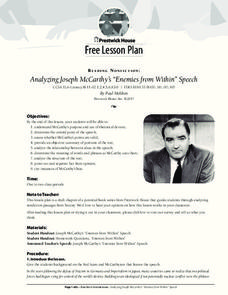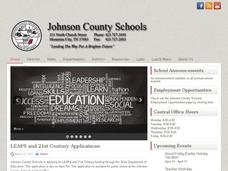Curated OER
Understanding and Using Primary and Secondary Sources in History
Explore primary and secondary sources in this historical analysis lesson. Young researchers define the terms primary source and secondary source. They read a primary source document provided by the teacher and answer questions about the...
Curated OER
Fact vs. Opinion
Students explore fact versus opinion in reading material. They listen to sentences and use hand signals to identify if the sentences are facts or opinions. After reading a story, they vote on sentences for facts and opinions and stae a...
Curated OER
"The Clever Monkey"
Second graders complete a variety of activities related to the book "The Clever Monkey" by Rob Cleveland. They answer story comprehension questions, and rewrite the story. Students also complete a comprehension and fact or opinion...
Curated OER
Martin Luther King Jr.: A Fact Or Opinion Activity
Students discuss the difference between fact and opinion, then read a brief biography of Martin Luther King Jr. They complete the Martin Luther King Jr.: Fact or Opinion worksheet.
Prestwick House
Reading Nonfiction: Analyzing Joseph McCarthy's "Enemies from Within" Speech
Looking for a instructional activity that teaches class members how to analyze nonfiction? Use Joseph McCarthy's famous "Enemies from Within" speech as a instructional text. Worksheet questions direct readers' attention to the many...
Curated OER
Active Reading with American History
Explore connections within and between informational texts with this lesson about encyclopedia articles. Middle schoolers write encyclopedia articles focusing on topics in American history. They discuss how to determine credibility...
Curated OER
Fact and Opinion
Students determine the difference between fact and opinion. They identify facts and opinions in a report. Students discuss the porportion of fact and opinion in a report. Students write a profile of the place they live and evaluate facts...
Curated OER
Fact V. Opinion
Students distinguish between fact and opinion when reading material. They use statements of objects to determine if they are facts or opinions.
Curated OER
Expressing Your Views to the Letter
Analyze the motivation, purpose, and value of letters to the editor by examining letters written in response to the violence at Columbine High School. For homework, middle and high schoolers write their own letters to the editor about an...
Curated OER
Fact and Opinion Project
Students draw an illustration of facts and opinions gleaned from a newspaper. In this fact and opinion instructional activity, students read a newspaper and write down specific information. Students illustrate their facts and opinions on...
Curated OER
Determine Fact and Opinion
In this fact and opinion worksheet, students read sentences and label the sentences as either a fact or an opinion. Students complete 12 problems.
Curated OER
Fact or Opinion
For this fact or opinion worksheet, students read sentences and label them as either being facts or opinions. Students complete 12 problems.
Curated OER
Fact or Opinion?
Third graders design a political cartoon. In this fact and opinion activity, 3rd graders examine political cartoons and distinguish fact from opinion. Students create a political cartoon on the topic of their choice.
Curated OER
It's Your Opinion
Everyone has a different opinion about the characters they read about in books. Have your class explore forming an opinion and finding evidence to support it as they read and discuss what they think about a particular character. They...
Curated OER
Fighting Fake News
Fake news. Alternative facts. Internet trolls. In an age of Newspeak, it's increasingly important to equip 21st century learners with the skills needed to determine the legitimacy of claims put forth on social media, in print, and in...
Curated OER
A Way with Words
How do facts and opinions impact the news? After reading "How to Cover a War" from the New York Times, middle schoolers evaluate the claims in the article. They also consider the media's responsibilities in reporting during wartime....
Curated OER
8th Grade Reading Comprehension Success
Augment your eighth grade language arts curriculum with a thorough set of reading comprehension activities and assessments. Focusing on a variety of skills, including vocabulary in context, text structure, main idea, and author's style,...
Curated OER
Creature Feature Poetry Keyword Search!
Young scholars examine the differences between fact and opinion, and brainstorm ideas for a keyword list by analyzing facts. They listen to poems, and create posters listing three keywords about each creature featured in the poetry.
Newseum
The Fundamentals of News
A short video introduces middle schoolers to different media-related news terms. Viewers then complete a worksheet and discuss the differences between news and journalism, between facts and opinions.
Curated OER
Identifying Facts and Opinions
Students understand the difference between a fact and an opinion. They identify facts and opinions in a news report. They identify facts and opinions in print and color code them with different colors.
EngageNY
Identifying Author’s Opinion and Evidence: The Value of Sports in People’s Lives, Part I
Just like instant replay, it's time to take a closer look! Pupils work together to add ideas to a Close Readers Do These Things anchor chart. They then put their knowledge to the test as they read an informational article about the...
Curated OER
That Is Not My Opinion!
Being an informed citizen requires distinguishing fact from opinion and understanding persuasion methods. Secondary learners evaluate newspaper editorials. They read opinion pieces, identify the writer's purpose and position on an issue,...
Curated OER
Fact and Opinion Race
Third graders differentiate between fact and opinion. They determine if a statement is a fact or an opinion. Students race to be the first team to make it to the finish line while determining if statements are facts or opinions.
Curated OER
Determining Author's Point of View: The Sneeches
Determine the author's point of view in a text. Young readers read Dr. Seuss' The Sneeches and identify the author's purpose in the story. They identify persuasive techniques in writing, asking and answering questions to better...

























